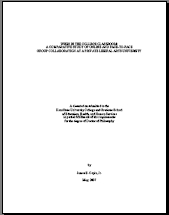Wikis in the College ClassroomA Comparative Study of Online and Face-to-Face Group Collaboration at a Private Liberal Arts University.
|

|
 Diese Seite wurde seit 6 Jahren inhaltlich nicht mehr aktualisiert.
Unter Umständen ist sie nicht mehr aktuell.
Diese Seite wurde seit 6 Jahren inhaltlich nicht mehr aktualisiert.
Unter Umständen ist sie nicht mehr aktuell.
 Zusammenfassungen
Zusammenfassungen
 Research Questions
Research Questions
- What benefits to collaboration do students experience in face-to-face class assignments?
- What obstacles to collaboration do students experience in face-to-face class assignments?
- What benefits to collaboration do students experience when using an online Wiki for class assignments?
- What obstacles to collaboration do students experience when using an online Wiki for class assignments?
- Is there a difference between Wiki group collaboration and non-Wiki group collaboration in terms of the quality of the final product?
- Is there a difference in students’ experiences of learning and sense of community after Wiki-based collaboration and face-to-face collaboration assignments?
 Wikis are Web-based online software programs that allow any user to add, edit, or delete content on a Wiki web page. Because of their relative simplicity and their interactive nature, Wikis are potentially effective tools for online collaborative group work, a type of activity frequently used in online distance education. This study examined online Wiki collaboration compared to more conventional face-to-face group collaboration in higher education.
Wikis are Web-based online software programs that allow any user to add, edit, or delete content on a Wiki web page. Because of their relative simplicity and their interactive nature, Wikis are potentially effective tools for online collaborative group work, a type of activity frequently used in online distance education. This study examined online Wiki collaboration compared to more conventional face-to-face group collaboration in higher education.The study participants were juniors and seniors taking a senior-level broadcast communications course. They were divided into two groups, and each group collaborated on writing reports using both conventional face-to-face collaboration methods and collaboration using the Wiki function in Moodle course management software. Following completion of the reports, professional subject matter experts rated the quality of the reports according to specified content and format criteria. The study’s research questions addressed (1) benefits and obstacles experienced in face-to-face collaboration; (2) benefits and obstacles experienced in Wiki-based group collaboration; (3) whether there was a difference between Wiki group collaboration and face-to-face group collaboration in terms of the quality of the final product; and (4) whether there was a difference in students’ experiences of learning and sense of community after Wiki-based collaboration and face-to-face collaboration assignments.
Results indicated there was no difference in the quality of reports related to the method of collaboration, suggesting that Wikis are an effective collaboration method; face-to-face collaboration is more efficient in terms of communication among group members and is sometimes preferred because it is familiar; Wiki collaboration allowed students to work at their own pace and to easily see the work of other group members; students adapted Wiki capabilities to their previous methods of group work; and there was not a significant difference in students’ experiences of learning and community between the two methods. Even though the Wiki software provided the capability, participants did not edit one another’s Wiki work unless they had volunteered and were designated by the group to be an editor. Unless they were an editor, individual participants did not feel it was appropriate to change their peers’ work.
 Diese Doktorarbeit erwähnt ...
Diese Doktorarbeit erwähnt ...
 Personen KB IB clear | Axel Bruns , Ward Cunningham , Anja Ebersbach , Renée Fountain , Thomas Friedman , Markus Glaser , Richard Heigl , Sal Humphreys , Brian Lamb , Bo Leuf , Stewart Mader , Marshall McLuhan , L. J. Perelman , Marc Prensky , Robert Putnam , Howard Rheingold , Will Richardson , Don Tapscott | ||||||||||||||||||||||||||||||||||||||||||||||||||||||||||||||||||||||||||||||||||||||||||||||||||||||||||||||||||||||||||||||
 Begriffe KB IB clear | informal learninginformal learning
,  Lernen Lernen learning
, microworldmicroworld
, Simulation
, learning
, microworldmicroworld
, Simulation
,  USA
, Wikiwiki
, Wiki in educationWiki in education
, USA
, Wikiwiki
, Wiki in educationWiki in education
,  Wikipedia Wikipedia
| ||||||||||||||||||||||||||||||||||||||||||||||||||||||||||||||||||||||||||||||||||||||||||||||||||||||||||||||||||||||||||||||
 Bücher |
| ||||||||||||||||||||||||||||||||||||||||||||||||||||||||||||||||||||||||||||||||||||||||||||||||||||||||||||||||||||||||||||||
 Texte |
|
 Diese Doktorarbeit erwähnt vermutlich nicht ...
Diese Doktorarbeit erwähnt vermutlich nicht ... 
 Nicht erwähnte Begriffe | formal learning |
 Tagcloud
Tagcloud
 Zitationsgraph
Zitationsgraph
 Zitationsgraph (Beta-Test mit vis.js)
Zitationsgraph (Beta-Test mit vis.js)
 Zeitleiste
Zeitleiste
 Volltext dieses Dokuments
Volltext dieses Dokuments
 |  Wikis in the College Classroom: Gesamtes Buch als Volltext ( Wikis in the College Classroom: Gesamtes Buch als Volltext ( : :  , 931 kByte; , 931 kByte;  : :  Link unterbrochen? Letzte Überprüfung: 2020-11-28 Letzte erfolgreiche Überprüfung: 2019-05-11) Link unterbrochen? Letzte Überprüfung: 2020-11-28 Letzte erfolgreiche Überprüfung: 2019-05-11) |
 Anderswo suchen
Anderswo suchen 
 Beat und diese Dissertation
Beat und diese Dissertation
Beat war Co-Leiter des ICT-Kompetenzzentrums TOP während er diese Dissertation ins Biblionetz aufgenommen hat. Die bisher letzte Bearbeitung erfolgte während seiner Zeit am Institut für Medien und Schule. Beat besitzt kein physisches, aber ein digitales Exemplar. Eine digitale Version ist auf dem Internet verfügbar (s.o.). Es gibt bisher nur wenige Objekte im Biblionetz, die dieses Werk zitieren.
























 Biblionetz-History
Biblionetz-History